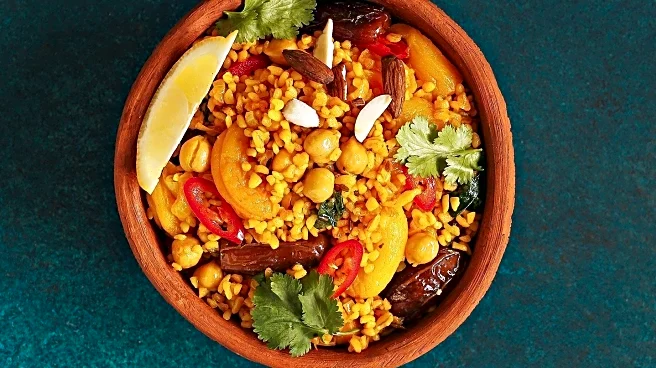What's Happening?
Ruby Tandoh, known for her appearance on The Great British Bake Off, has released a new book titled 'All Consuming'. Unlike her previous works, this book is not a cookbook but rather an exploration of why people eat and drink what they do. Tandoh's writing is characterized by its humor and insightful commentary on the cultural and political aspects of food. The book delves into various topics, including the rise of exotic desserts, the influence of social media on food culture, and the historical significance of food writing. Tandoh's perspective is both critical and affectionate, offering a nuanced view of contemporary food trends and their implications.
Why It's Important?
The release of 'All Consuming' is significant as it challenges traditional narratives around food and eating habits. Tandoh's work encourages readers to think critically about the cultural and social factors that influence their dietary choices. By addressing the impact of social media and the globalization of food trends, the book highlights the evolving nature of food culture. This perspective is particularly relevant in today's society, where food is not only a source of sustenance but also a form of identity and expression. Tandoh's insights could influence how individuals and communities perceive and engage with food, potentially leading to more mindful and informed eating practices.
What's Next?
As 'All Consuming' gains readership, it may spark discussions about the role of food in society and the ways in which it is marketed and consumed. Tandoh's book could inspire other authors and food critics to explore similar themes, contributing to a broader dialogue about food culture. Additionally, readers may begin to question their own eating habits and the societal pressures that shape them. The book's impact could extend beyond the literary world, influencing public discourse on food-related issues and encouraging a more holistic approach to eating.
Beyond the Headlines
Tandoh's exploration of food culture in 'All Consuming' also touches on ethical considerations, such as the sustainability of food production and the cultural appropriation of culinary traditions. By examining these issues, the book prompts readers to consider the broader implications of their food choices. This could lead to increased awareness and advocacy for ethical and sustainable food practices, as well as a greater appreciation for the diversity of global cuisines.










